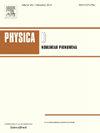Observability of complex systems via conserved quantities
IF 2.7
3区 数学
Q1 MATHEMATICS, APPLIED
引用次数: 0
Abstract
Many systems in biology, physics, and engineering are modeled by nonlinear dynamical systems where the states are usually unknown and only a subset of the state variables can be physically measured. Can we understand the full system from what we measure? In the mathematics literature, this question is framed as the observability problem. It has to do with recovering information about the state variables from the observed states (the measurements). In this paper, we relate the observability problem to another structural feature of many models relevant in the physical and biological sciences: the conserved quantity. For models based on systems of differential equations, conserved quantities offer desirable properties such as dimension reduction which simplifies model analysis. Here, we use differential embeddings to show that conserved quantities involving a set of special variables provide more flexibility in what can be measured to address the observability problem for systems of interest in biology. Specifically, we provide conditions under which a collection of conserved quantities make the system observable. We apply our methods to provide alternate measurable variables in models where conserved quantities have been used for model analysis historically in biological contexts.
复杂系统通过守恒量的可观测性
生物学、物理学和工程学中的许多系统都是由非线性动力系统建模的,其中状态通常是未知的,只有一部分状态变量可以物理测量。我们能从我们测量的东西中理解整个系统吗?在数学文献中,这个问题被定义为可观察性问题。它与从观察到的状态(测量)中恢复状态变量的信息有关。在本文中,我们将可观测性问题与物理和生物科学中许多相关模型的另一个结构特征:守恒量联系起来。对于基于微分方程组的模型,守恒量提供了理想的特性,如降维,从而简化了模型分析。在这里,我们使用微分嵌入来表明,涉及一组特殊变量的守恒量在可测量的内容上提供了更大的灵活性,以解决生物学中感兴趣的系统的可观察性问题。具体地说,我们提供了一些条件,在这些条件下,守恒量的集合使系统可观测。我们应用我们的方法在模型中提供替代的可测量变量,其中保守量在生物学背景下历史上用于模型分析。
本文章由计算机程序翻译,如有差异,请以英文原文为准。
求助全文
约1分钟内获得全文
求助全文
来源期刊

Physica D: Nonlinear Phenomena
物理-物理:数学物理
CiteScore
7.30
自引率
7.50%
发文量
213
审稿时长
65 days
期刊介绍:
Physica D (Nonlinear Phenomena) publishes research and review articles reporting on experimental and theoretical works, techniques and ideas that advance the understanding of nonlinear phenomena. Topics encompass wave motion in physical, chemical and biological systems; physical or biological phenomena governed by nonlinear field equations, including hydrodynamics and turbulence; pattern formation and cooperative phenomena; instability, bifurcations, chaos, and space-time disorder; integrable/Hamiltonian systems; asymptotic analysis and, more generally, mathematical methods for nonlinear systems.
 求助内容:
求助内容: 应助结果提醒方式:
应助结果提醒方式:


